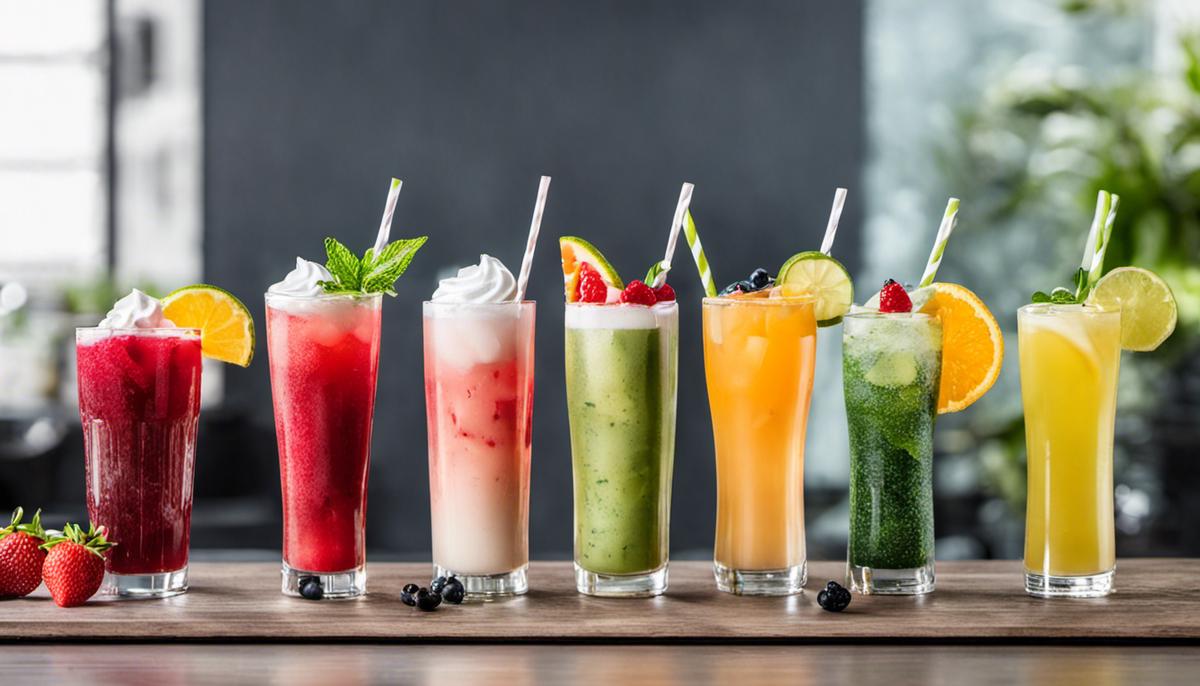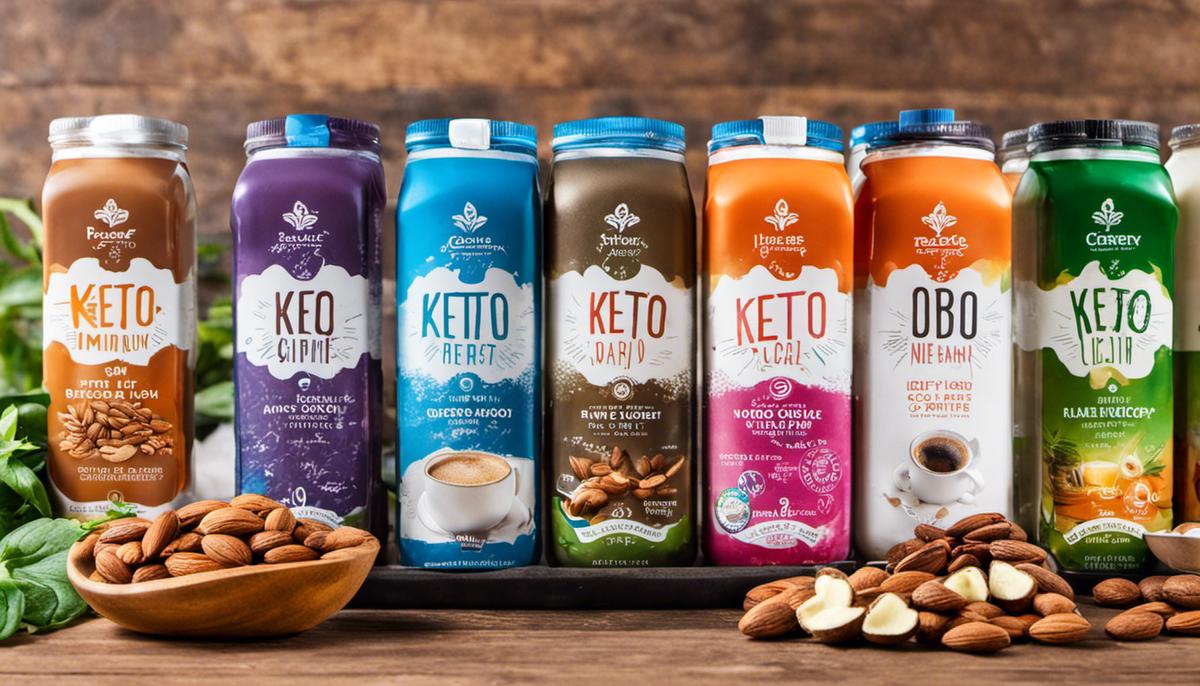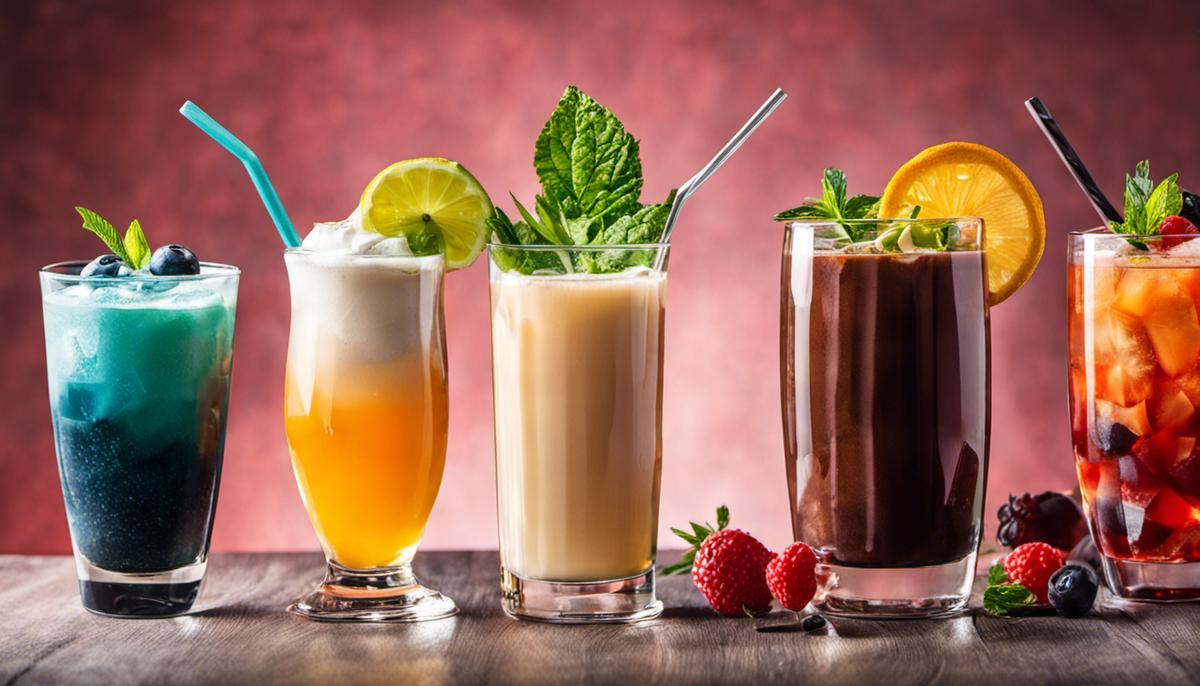In recent years, the ketogenic diet, known popularly as the Keto diet, has gained substantial recognition for its remarkable weight loss results. Yet achieving success in this low-carb, high-fat diet is as much about what you drink as what you eat. A strategic beverage choice can not only help your body reach or maintain the state of ketosis but also improve your overall health. In addition to explaining the health benefits and principles of a ketogenic diet, this comprehensive guide will dispel common myths about keto-friendly drinks. Moreover, it will introduce a variety of recommended drinks that you can comfortably incorporate into your diet and explore their impact on bodily functions and well-being.
Understanding the Keto Diet
Understanding the Keto Diet
The Ketogenic (Keto) diet is a low-carb, high-fat diet designed to alter the way your body uses energy. The human body primarily uses glucose from carbohydrates as an energy source. However, when you drastically limit your carbohydrate intake, like in the keto diet, your body is forced to find an alternative fuel source.
In the absence of sufficient carbohydrates, the body starts to break down stored and dietary fat into compounds known as ketones. As the body starts to use ketones as a primary energy source, it enters a metabolic state known as ketosis.
The Keto diet has seen an increase in popularity due to its potential health benefits. Some of these potential benefits include weight loss, improved blood sugar control, and enhanced brain function. While more research is needed, some studies suggest that the Keto diet may also help manage conditions like epilepsy, Alzheimer’s disease, and certain types of cancer.
Keto Diet and Hydration
Hydration is essential for overall health, and it holds significant importance when you’re on a keto diet. During the initial phase of the keto diet, as the body adjusts to the reduced carbohydrate intake, it tends to lose water weight, which makes proper hydration crucial. Chronic dehydration can lead to issues like fatigue, dizziness, and constipation.
Understanding Keto-Compatible Beverages
When adhering to a ketogenic diet, it’s essential to be mindful of the types of beverages consumed as many standard drinks may contain high levels of carbohydrates that do not align with keto dietary objectives.
Beverages compatible with a ketogenic lifestyle focus on maintaining low carbohydrate and sugar levels. Water, with no carbs and zero calories, is a top choice for hydration. Enhancing its flavor with a slice of lemon or apple cider vinegar will not inhibit the body from entering or being in a state of ketosis.
Unsweetened tea and coffee, eliminated of any added sugar or milk, offer additional appropriate options for keto adherents. If creaminess is preferred, traditional milk can be replaced by heavy cream or unsweetened almond milk. Another useful selection is bone broth, beneficial due to its dense nutrient composition and ability to hydrate.
Serving as an alcohol guideline, limit intake as alcoholic beverages are often high in carbohydrates. However, some contain fewer carbs, like dry wine, light beer, and certain spirits, making them permissible in a keto diet when moderately consumed.
Hydration in a keto diet involves more than mere water consumption—replenishing lost electrolytes is crucial due to increased potential water loss and decreased water retention. Drinking waters infused with electrolytes or making homemade drinks friendly to a keto diet can aid in maintaining a balanced level of these essential minerals.
To summarize, authentic keto-compatible beverages are usually low in carbs, rich in flavor, and nutrition-filled. Learning about these drinks can support you in meeting your health and wellness objectives. Enjoy a variety of hydration options that effectively support your energy needs and complement your keto lifestyle.

Common Misconceptions about Drinks in Keto
Dispelling Misconceptions about Keto Compatible Drinks
There are shared misconceptions in the keto community, one of which being that ‘sugar-free’ or low-sugar drinks are automatically compatible with a ketogenic diet. However, not all these drinks are suitable for this lifestyle. Some may contain sugar alcohols or artificial sweeteners which can impact blood sugar levels and interrupt ketosis. Diet sodas are a prime example of this misconception. Despite most of them not containing any sugar, the artificial sweeteners they are made with could potentially affect your ketosis state.
Hidden Sugars and Carbs in Beverages
Another misconception that often trips up those following a keto diet involves hidden sugars and carbs in beverages. Just because a drink might be marketed as healthy or low in sugar does not mean it doesn’t contain carbohydrates. An example would be fruit juice. Even 100% pure juice is packed with natural sugars, which can be high in carbs and thus knock you out of ketosis.
Similarly, specialty coffees and teas like that from popular coffee shops often contain high levels of hidden sugars and carbs. A drinks’ carb content can skyrocket due to flavored syrups, sugar, milk, or cream. If you’re on keto, it’s generally safer to stick with plain coffee or tea and use a sugar substitute if needed.
Alcoholic Beverages and Keto
When it comes to alcoholic beverages, another common misconception is that clear liquors or dry wines are entirely keto-friendly. While these choices may be lower in carbs than their counterparts, they can still affect your ketosis because of the nature of alcohol metabolism. When alcohol is consumed, your body prioritizes metabolizing it over fats, temporarily halting the ketosis process. Some people may find their weight loss efforts stall when consuming alcohol, even if they’re drinking low-carb options.
Hydration is Key
Additionally, many followers of the keto diet may overlook the importance of drinking water. Hydration is key to any diet, including keto. The process of burning fat for energy on keto (ketosis) requires increased water intake due to water loss from decreased carbohydrate intake. Inadequate hydration may lead to feelings of fatigue or light-headedness.
What to Drink on Keto
So what are some truly keto-friendly drink options? Water, including sparkling water, is always a safe bet. Coffee and tea, without added sugar, milk, or cream, are also typically keto-friendly. Bone broth is another excellent option that provides essential minerals and helps with hydration. If you prefer something with more flavor, consider adding a squeeze of fresh lemon or lime to your water or infusing it with cucumbers or fresh mint for a refreshing, low-carb drink.
When adhering to a ketogenic diet, it’s crucial to inspect the nutritional contents of the drinks keenly, making sure they align with this specific low-carb, high-fat eating plan. Many beverages might seem low in sugars or carbohydrates, but they may not necessarily be optimal for a ketogenic lifestyle. By taking the time to learn about these potential missteps and misconceptions, you’ll be better prepared to make healthier, more keto-compatible choices that can assist you in maintaining ketosis and achieving your weight loss objectives.

Recommended Keto Friendly Drinks
Delving into the Realm of Keto-Compatible Beverages
The ketogenic – or keto – diet, renowned for its low-carb, high-fat guidelines, propels your body into a metabolic state commonly referred to as ketosis. In ketosis, your body efficiently ensures caloric energy by burning fat and producing ketones in the liver, hence the diet’s name ‘ketogenic’. To keep your body in this metabolic state, you have to restrict carbohydrate intake, which includes careful consideration of your beverage selection. However, restricting carbs does not translate to solely consuming water. Many keto-friendly beverages are available on the market, all of which are low in carbs. They offer not only the benefit of hydration but also allow you to indulge in a broad spectrum of flavors.
Store-bought Keto Drinks
Store-bought options for keto-friendly drinks are plentiful. This includes unsweetened almond milk and coconut milk. These are low in carbs and high in healthy fats. Other options include zero carb energy drinks, diet soda and flavored water, as long as they don’t contain added sugars. Coffee and tea can be consumed on keto, but sugar and high-carb creamers should be avoided. To sweeten your tea or coffee, try using keto-friendly sweeteners like stevia and erythritol.
Homemade Keto Friendly Drinks
Homemade concoctions open up more opportunities to tailor-make drinks to fit personal preferences. This could include making a keto-friendly smoothie using high-fat, low-carb ingredients like spinach, avocado, and a small amount of berries with unsweetened almond milk. You could also make a keto-friendly coffee by blending black coffee with a spoonful of coconut oil or unsalted butter. This is often referred to as “bulletproof coffee”.
Keto Adaptations of Popular Beverages
Popular beverages can also be adjusted to fit the low-carb requirements of the ketogenic diet. This could involve swapping sugary mixers for soda water or diet soda when making cocktails. For beer lovers, there are ‘light’ versions of many major brands offering reduced carbs contents. If you enjoy fruit juice, opt for a low-carb fruit juice or a vegetable-based juice instead.
Creating Keto Diet-Friendly Drinks
Designing beverages that align with the ketogenic diet requires an understanding of the carb content from each ingredient. Always opt for drink versions that are unsweetened during your shopping trips. To sweeten your drinks without adding carbs, consider keto-friendly sweeteners like erythritol or stevia. Always inspect the nutritional information on the label to ensure your choices fit within your daily carbohydrate allowance.
In your homemade drink recipes, feel free to be inventive but always keep in mind the keto diet’s tenets of low carbohydrate and high fat. This might include adding a spoonful of MCT oil to your morning coffee or a handful of spinach to your mid-day smoothie.
Bear in mind, while these drinks are suitable for consumption within a ketogenic diet framework, water should remain the chief drink for your hydration. It’s vital for hydration and facilitates your digestive system’s smooth operation without contributing to your daily carbohydrate count.

Impact of Keto Drinks on Health and Well-being
Ketogenic Diet Principles and Keto-Compliant Beverages
The ketogenic diet, also known as keto, is a nutritional framework grounded in low-carb, high-fat eating patterns. Its primary aim is to induce a metabolic state called ketosis, where the body opts to burn fat instead of carbohydrates for energy. Generally, a ketogenic diet consists of approximately 70-75% fat, 20% protein, and a mere 5-10% carbohydrates.
Keto-compliant beverages are specifically those that fit within these dietary boundaries. They encompass drinks such as unsweetened coffee or tea, water, diet sodas, and particular low-carb smoothies or shakes. These beverages provide essential hydration without introducing additional carbs or sugars that could potentially disrupt or prevent the ketosis state.
Impact of Keto Drinks on the Ketogenic Diet and Overall Health
Keto drinks can play an essential role in maintaining the effectiveness of the ketogenic diet. When adhering to a keto diet, it is crucial to consider not only solid food but also drinks. Consuming drinks high in sugar or carbs can swiftly take the body out of its state of ketosis.
In addition, hydration is a crucial component of overall health. Remaining well-hydrated can promote heart health, assist in maintaining body temperature, support the digestion process, and aid in nutrient absorption. The fact that most keto-friendly drinks are also calorie-free or low-calorie can also serve those aiming for weight loss.
Keto drinks can also provide energy. Many keto dieters rely on beverages like coffee, tea, or certain keto-friendly energy drinks as sources of energy in the absence of carbohydrates. As an added benefit, drinks like coffee and tea also have antioxidants that contribute positively to overall health.
Potential Side Effects and Considerations
Despite these benefits, there can be potential side effects to consuming only keto-friendly beverages. The most common side effect is known as the “keto flu,” symptoms of which can include nausea, headache, fatigue, dizziness, irritability, and difficulty focusing. This often occurs when the body first enters ketosis. Consuming sufficient electrolytes, vitamins, and minerals through hydration can alleviate some of these symptoms.
In addition, not all keto-friendly drinks are created equal. Some drinks might appear keto-friendly based on their low sugar or carb content but might contain artificial sweeteners or other harmful additives. As a result, it’s important to pay attention to the full list of ingredients in any drink, not just its carb or sugar content.
Expert Recommendations
Experts suggest intake of water as the primary beverage due to its essential role in maintaining hydration levels and overall health. It is also recommended to limit the consumption of artificially sweetened beverages like diet sodas, as some studies show they may increase cravings for sweets. Herbal teas and bone broth are highly recommended because they provide essential vitamins, minerals, and electrolytes.
In conclusion, as with any dietary change, it is best to consult with a healthcare provider or a dietitian before making a switch to only consuming keto-friendly drinks. They can provide personalized advice and recommendations depending on your specific health needs.

The ketogenic diet journey becomes smoother, more enjoyable, and more fruitful when accompanied by the right choice of beverages. Through understanding the function of the keto diet and discarding misconceived notions about keto-friendly drinks, you can effectively navigate your way to healthier yet tasty beverage options. While these drinks contribute positively to your diet, you must be aware of their potential side effects. Equipped with this robust knowledge base, you are now enabled to make informed decisions about your hydration routine while consistently maintaining a state of ketosis. Your daily intake of liquids can thus be transformed from a mundane necessity to an exciting part of your health journey.
